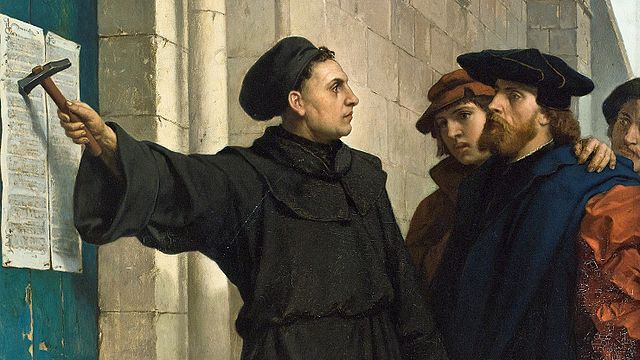As a former Lutheran myself, this is all very unexpected.
I was under the distinct impression that Martin Luther was not regarded favorably by the Church. (“The Pope is the Antichrist” thing; the excommunication bit.) When my husband wanted to become Catholic and I (emphatically) did not, I dreaded Reformation Sunday. I even asked him to put aside his opinions about this historic event for one day, so we could enjoy the festivities. Can’t we just celebrate the reformers breaking free from the horrors of Catholicism? The priests, nuns, saints, confession, male chauvinists, etc.?
So it’s odd, after so much effort and struggle on my husband’s part, all the prayers, research, hours logged on New Advent, and listening to Catholic Answers—that now we’re having a joint party. Had the pope crashed our Reformation service I would have questioned the pope’s convictions, not my own.
But that didn’t happen. I enjoyed my Reformation Sunday, and another one after that, before the blinders came off. As I devoured Catholic books, the Church became not just compelling but irresistible. So I jumped in, heart and soul and mind, desiring conversion.
In one sense, life switched courses completely at that moment. There was a clear division between the “old self” and the “new self.” Many of my beliefs changed, and so did many of my actions and intentions. My thinking could be classified as “before” and “after.” If both religions are basically the same, that wouldn’t have been the case.
There is another severing I’m intimately acquainted with: divorce.
When a mother and father divorce, the children are the ones who long for unity to be restored, even long after childhood has ended. They remember what it was like to have the family together, to feel happy, secure, and part of something larger than themselves: the product of love.
By contrast, in the dissolution ushered in by the Reformation, it is our parents—God our Father and Mary our Mother—who hold dear the memory of a united Christendom, a reality which no modern Catholic has ever known, of a time when there weren’t a thousand splinter religions.
Now Protestantism finds itself in the same boat as modern families: made up of tenuous links, attachments made and broken, just like the flotsam and jetsam left behind in the wreckage wrought by divorce.
And just like the child of divorce, we are asked to look at the Reformation and see only the good that came of it, the good work done by various churches and the renewal within the Church in response to the 95 theses.
 |
| Luther posting his 95 theses in 1517, By Ferdinand Pauwels, 1872. |
But isn’t this like parents asking their children to gloss over the redefinition of “family” in favor of the very polygamy which Christ abolished? They are also asked to validate the changes in mom and dad’s new and “reformed” lives, to be happy for them—to see only the good. But the fact remains: there can never be a just substitute for the loss of fidelity, unity, and continuity between husband and wife, parents and children.
When we dare to celebrate the occasion of the Protestant Revolution, we are saying exactly what proponents of divorce say: “Do what makes you happy,” and “Keep searching until you find it.” Whether the goal is a better spouse or a better religion with just the right mix of teachings, or the right number of sacraments.
It is not wrong to want others to have the graces offered only within the Catholic Church. My husband continued to want that for me even when I rejected it and held fast to Lutheranism—and what a blessing his perseverance has been to our lives. There was ample reason to celebrate my departure from Reformation Sunday festivities and subsequent entrance into the Church of Christ. For She alone possesses the sacraments and priests, dogmas and doctrines, martyrs and saints, which unite us in “one Lord, one faith, one baptism” to God our Father and Mary our Mother.
Normally we celebrate anniversaries we wish to see repeated: birthdays, weddings, sobriety. Do we want another Reformation? That depends on who you ask.
Follow





